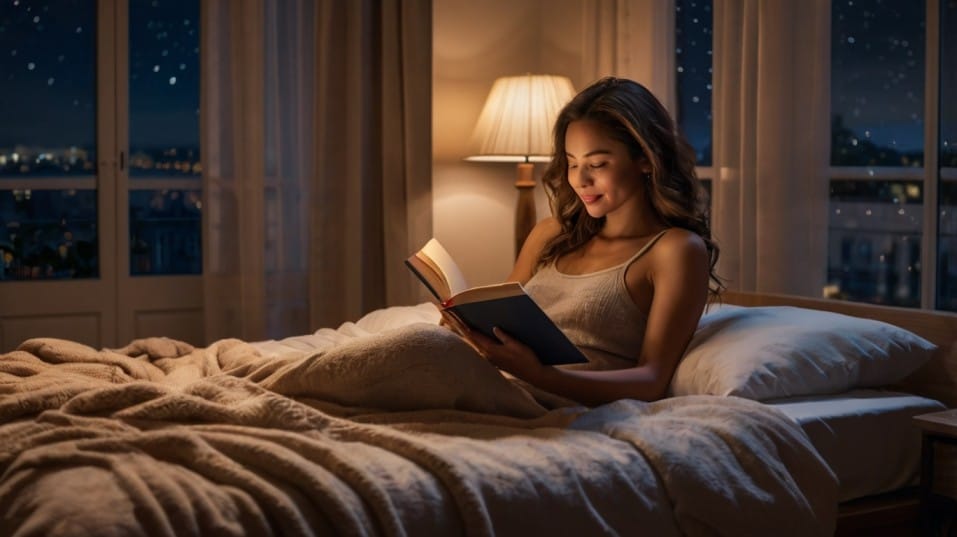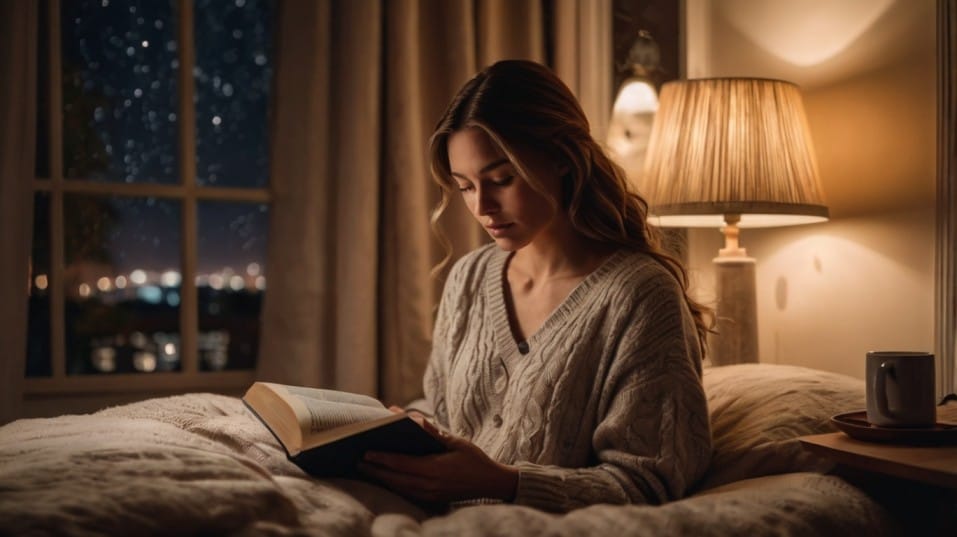Does Reading Help You Sleep? It Depends How You Do It
Learn how to use reading as a sleep tool—what to read, how to set it up, and why it can train your brain to wind down faster.

Can a book really help you sleep better? Yes—if you read with purpose. Scrolling before bed keeps your brain buzzing.
But the right kind of reading can help you switch off and settle in. It’s not magic, it’s habit—and done right, it becomes a powerful cue for rest.
Whether you’re chasing deeper sleep, better focus, or calmer nights, here’s how to turn reading into your go-to bedtime ritual.
The Sleep-Reading Connection: Why It Actually Works
Let’s get this straight—reading doesn’t magically knock you out. But it does create the right mental environment for sleep to happen. Here's how:
Reading helps lower your heart rate, ease mental chatter, and shift your focus away from the overstimulating flood of daily input.
Research from the University of Sussex found that reading for just six minutes can reduce stress levels by up to 68%. That’s more effective than listening to music or going for a walk.
Stress is one of the biggest barriers to quality sleep, so anything that dials it down—without medication or screen time—is worth attention.
And it’s not just about stress relief. Done consistently, reading can function like a trigger. When you read every night in the same spot, under the same conditions, your brain starts linking the act with winding down.
Over time, reading becomes part of your internal sleep cue system. You’re not forcing yourself to sleep—you’re training your body to anticipate it.

What You Read Matters (No, You Don’t Need to Be Bored)
If your strategy is to read something dull and hope you nod off, you’re doing it wrong. The goal isn’t boredom. It’s emotional neutrality.
You want content that holds your attention without sparking adrenaline, anger, or big ideas that keep your brain working overtime.
Think calm fiction, meandering essays, travel writing, light memoirs, or gentle philosophy. The kind of material that feels like a mental stroll, not a sprint.
Here’s what to avoid if you actually want to sleep:
- Thrillers, horror, or page-turners – They raise cortisol levels and disrupt melatonin production.
- Work-related reading – Anything that pulls you back into productivity mode keeps the mind active.
- News or social media content – Too unpredictable. Too emotional. Too much.
- Self-help or business books – Even if they're inspiring, they often activate planning or problem-solving thoughts.
If you finish a chapter and feel calm, not hyped—that’s the right kind of book.
Design the Wind-Down: Create a Reading Ritual That Signals Sleep
Reading helps you sleep when it’s part of a deliberate wind-down routine.
This is where most people get it wrong—they plop into bed, flip open a book, and hope something clicks. But the way you set up the experience determines whether it leads to actual rest.
Start with lighting. Overhead lights are stimulating, and bright white LEDs signal your brain to stay alert. Use a warm-toned, low-lumen bedside lamp instead.
Even better—opt for amber or red-spectrum bulbs that support melatonin production. If you can dim your lights, even better.
Now the tech question. Yes, e-readers are fine—if they use e-ink displays like the Kindle Paperwhite.
These don’t emit the same level of blue light as phones or tablets. But if your only option is a tablet or smartphone, enable night mode or a blue light filter at least an hour before bed. And switch off notifications. You want zero interruptions.
And don’t multitask. No reading while half-watching Netflix. No audiobooks while scrolling. You’re not trying to “pass the time.” You’re building a neurological bridge to sleep.
Don’t Read Until You Pass Out—Here’s Why
This one matters. If you read until your eyelids droop, you’re making the book the sleeping pill.
That seems harmless, but it trains your brain to need the act of reading itself to fall asleep. That’s not the goal. Reading should be a signal, not a crutch.
Set a window—15 to 30 minutes—and stick to it. Close the book before you start nodding off. This tells your brain: reading = transition to sleep, not reading = unconsciousness. After that, it’s lights out. No “just one more chapter.”
This approach strengthens your sleep onset routine. Your body learns: wind-down, read, sleep. Repeat it enough, and it starts to happen on autopilot.
Consistency Is the Secret Weapon
Sleep loves routine. The more consistent your habits, the faster your body learns what’s happening and prepares accordingly.
So don’t just read when you feel like it. Make it a nightly ritual—even on weekends, even if you’re tired, even when your schedule shifts.
Choose the same general time. The same spot. Use the same light. Even the same type of book. Rituals create rhythm, and rhythm creates readiness.
Once this becomes your default end-of-day pattern, you’ll notice something powerful: your brain starts anticipating sleep earlier.
Your energy levels the next day improve. Focus gets sharper. You recover faster. You don’t force sleep—you invite it, and it shows up.
Final Thoughts: Sleep Smarter, Not Harder
Reading can absolutely help you fall asleep faster and sleep better—but only if you use it the right way. It’s not about forcing your eyes shut with a boring book.
It’s about creating a calm, consistent environment that tells your brain: it’s time to rest.
Here’s your move: Pick one calming book. Set up your space with soft lighting. Read at the same time every night. Stop before you’re sleepy. Repeat.
Start tonight. Don’t wait for the perfect moment or the perfect book. Just begin. Build the ritual, trust the rhythm, and let better sleep follow. Need book suggestions or a setup checklist to make it easier? Just ask.




